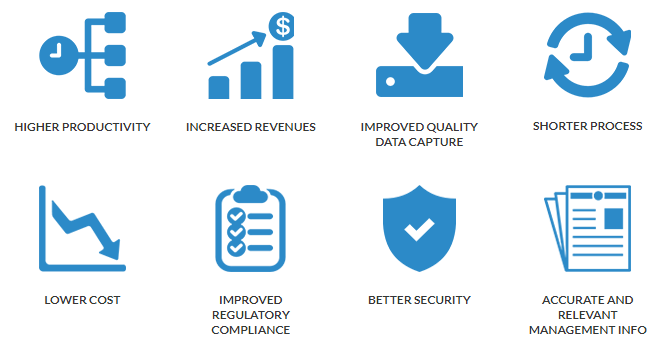Benefits of RFID – Why do you need RFID Solutions?
RFID is a highly versatile technology with applications throughout business – from controlling manufacturing processes to maintenance and inspection of equipment, managing assets and tracking goods through to distribution.
RFID systems offer benefits for businesses of all sizes, allowing them to rapidly improve efficiency and reduce cost by automating processes and improving utilization of assets and quality. RFID can form the basis of an effective asset management system and is also at the heart of the Internet of Things.
Here are some of the benefits of RFID:

Tracking assets and managing inventory
Keeping track of assets and materials is a challenge for most organizations – whether it is components on a production line, finished products being dispatched, industrial containers that need returning, or tools, laptops and other high-value equipment that often go missing. RFID systems offers a fast and reliable way to track them without having to count each individual item.
With RFID applications you can immediately see how many items you have of any one type and their location or what stage they are at in the process. You can track items from the time they are received into stores, issued to manufacturing and used in a finished item. This makes it easy to manage inventory, perform stock checks and audits and control ‘shrinkage’. RFID can also help to find items that are on site but have been misplaced.
Saving time and money through automation
RFID applications can automatically track the movement of goods and upload the information to the ERP or financial management system. Therefore they can remove the need for manual form filling and replace outdated spreadsheets. The use of fixed readers at key points can save even more time – and on a production line for example, can remove the need for manual intervention entirely.
Improving data accuracy and availability
Because data is being collected and uploaded electronically, RFID also avoids transcription errors, duplication of data and “missed items” when used to collect data on large numbers of items simultaneously. The use of cloud-based systems allows everyone in the organization to see up-to-date data on the whereabouts or status of items. Data can also be shared with customers.
Enhancing health and safety
RFID systems allow companies to check when equipment and vehicles have been inspected or when inspection is due, and restrict their use if certain conditions are not met. Systems like Checked OK offer an efficient way to manage inspection and reporting regimes and help satisfy insurers or regulatory bodies that processes are being followed.
Better control of production
Because RFID can identify individual items or components, it is ideal for complex or customized manufacturing processes – for example, to ensure that specific molds are filled with the correct volume of liquids and fired for the correct period of time, or specific components end up on the right production line. This helps reduce waste and improve efficiency.
Enhanced quality and traceability
RFID systems can also help ensure that items have passed through all the correct checks and processes – for example, a boiler has been assembled correctly and been inspected and approved before being delivered to the customer, thus improving quality and reducing the number of goods returned. RFID tagging can help ensure traceability by tracking an item right from its point of origin.
Increased revenues
By improving inventory management, organizations using RFID can provide a service that creates competitive differentiation and promotes increased customer satisfaction with the opportunities for higher sales and better margins.
More in-depth management information
Because RFID allows data to be captured in real-time at different stages in the asset’s or product’s lifecycle, it provides enhanced management information for planning and operational purposes. Companies can use these insights to drive further efficiency improvements.
Shorter processes
RFID technologies can be integrated with other manufacturing or supply chain technologies – such as automated pallet handling and stock picking systems – to reduce the time from order to dispatch and delivery.
Rapid payback time
RFID is a very cost-effective technology and the cost savings and enhanced revenues achieved can very quickly cover the cost of the initial outlay.





